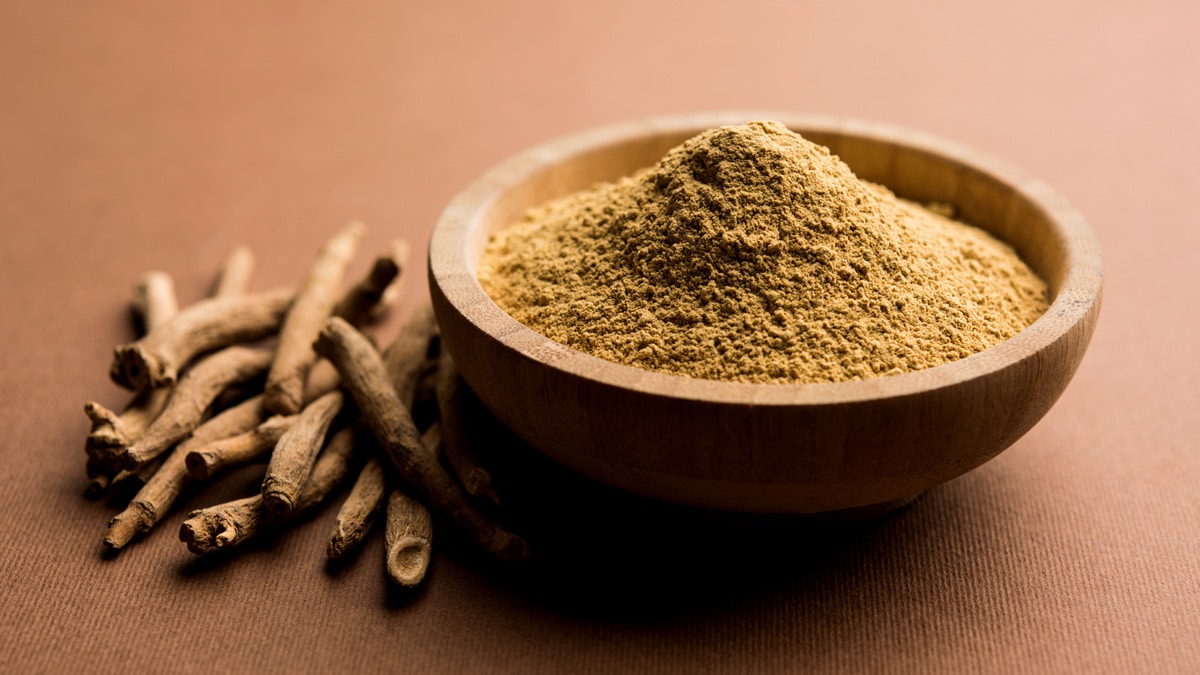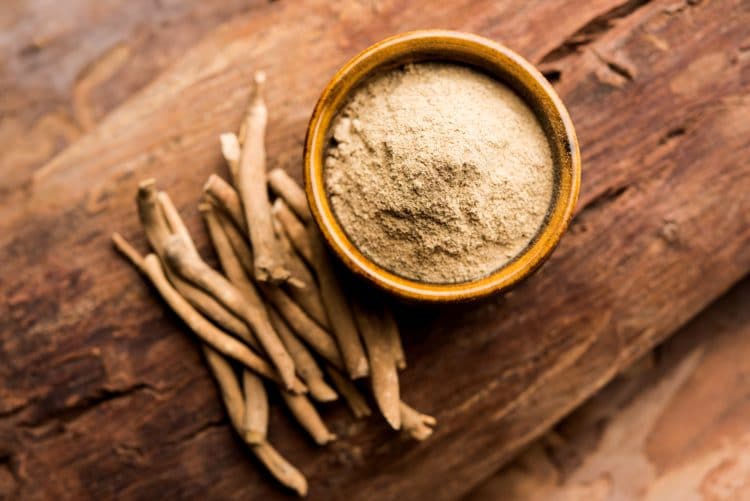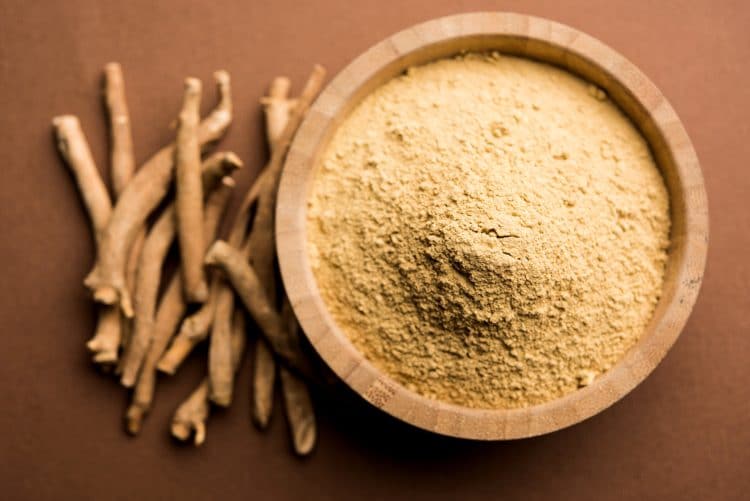How does a hot shower feel after a stressed-out day? Relaxing. Isn’t it?
What if we told you that consuming ashwagandha would give you a similar feeling. Additionally, some of its other health benefits include reducing anxiety and stress.
But how can you take ashwagandha? What is the best time to take it? Let’s understand.
What is Ashwagandha? Where does it come from?
Ashwagandha has been hailed as the king of ayurvedic herbs. It is a small evergreen shrub that grows in Asia, Africa, and parts of the Middle East. It has been used as a medicine for ages in Ayurveda (an alternative medicine system that originated in India). Ayurveda is a healing tradition that uses mindful practices, nutrition, exercise, and herbs to promote balance between mind, spirit, and the environment. (1)
Ashwagandha is known by many names, such as Indian Ginseng, Withania somnifera (botanical name), and Indian Winter cherry. Ashwagandha consists of two words: Ashva and gandha, which transcribes “smell of the horse” in Sanskrit. (1)
What are the Health Benefits of Ashwagandha?
Ashwagandha is popular because of its health benefits. The benefits associated with the plant are:
Reduces Stress And Anxiety
Ashwagandha is classified as an adaptogen — a substance that aids the body in coping with stress. Research has demonstrated that ashwagandha supplements may help reduce stress and anxiety.
A study on 58 participants who took ashwagandha extract for eight weeks reported reduced perceived stress and cortisol levels (a stress hormone). Moreover, these participants experienced improved sleep quality compared to those not on ashwagandha. (2)
Increase Athletic Performance
Research has demonstrated that ashwagandha could improve athletic performance. One analysis included 12 studies — the participants consumed 120 mg and 1,250 mg doses of ashwagandha per day. The meta-analysis indicated that the plant might enhance physical performance, including strength and oxygen use during exercise (3)
Decrease Symptoms of Some Mental Health Conditions
Preliminary research suggests that ashwagandha may help decrease the symptoms of mental health conditions, such as depression, schizophrenia, and bipolar disorder. However, limited research data is available to confirm its benefits for mental health conditions.
Reduce Blood Sugar Levels
A review found that ashwagandha may help decrease blood sugar levels, hemoglobin A1c, insulin, blood lipid, and oxidative stress markers. Certain chemical compounds found in the plant – withaferin mainly may possess anti-diabetic properties. However, more research is needed to confirm its effect. (4)
Improve Brain Function
Taking ashwagandha may help improve cognitive function. Cognitive functions include reaction time, executive functioning, attention, and performance in cognitive tasks.
A study on 50 adults taking 600 mg ashwagandha once daily for eight weeks demonstrated significant improvements in attention, information-processing speed, and immediate and general memory compared to people taking a placebo (an inert medicine). (5)
Improve Sleep
Research suggests that taking ashwagandha may help with sleep issues. A study on 50 adults found that consuming 600 mg daily of ashwagandha root for 12 weeks improved sleep quality and mental alertness upon waking compared to people who received a placebo. (6)
Decrease Inflammation
It is believed that ashwagandha contains many compounds that may help soothe inflammation in the body. Animal studies have demonstrated that it may help reduce inflammatory marker interleukin-10 (IL-10). (7)
Another study on adults on ashwagandha for 60 days found a significant reduction in levels of C-reactive protein — an inflammatory marker in the body — compared to those on placebo. (8)
Increase Testosterone Production And Fertility In Men
Some studies have shown that ashwagandha supplements may help increase testosterone levels and benefit male fertility. A study demonstrated that people taking the herb had an 18% increase in dehydroepiandrosterone sulfate or DHEA-S, a sex hormone involved in testosterone production, compared to a placebo. (9)
Furthermore, the herb can provide relief if you are dealing with the following conditions:
- Fatigue
- Arthritis
- Skin conditions
- Epilepsy
Although the herb is associated with multiple uses, limited research or data is available on its efficacy. Extensive research is required to demonstrate its effectiveness in various conditions.
What is The Best Time And Way To Take Ashwagandha?
Since the plant has many health benefits, you want to ensure you consume it at the right time to maximize its effectiveness.
Let’s get to the first part of the question: What is the best time to take it? Do you take it in the morning, evening, or after or with food?
Depending on your goals and tolerance, you can take it in the morning, evening, or night. Usually, you can take it any time of day or night. It can also be taken before or after meals. However, there is a possibility that some people might experience stomach discomfort when taken on an empty stomach. In such cases, you should take it after a meal.
Remember, the effects of the supplement are not immediate. It may take weeks before you experience or begin to notice results.
What is the best time to take ashwagandha?
When to take ashwagandha in the morning?
If you plan to take an ashwagandha herbal supplement to improve your overall health, you could take it in the morning. As mentioned above, if you experience stomach discomfort when consuming it on an empty stomach, it is best to consume it after breakfast.
When to take ashwagandha at night?
If your goal is to reduce stress and anxiety or improve sleep, you should take ashwagandha before bed.
Moreover, consuming the supp at night may be more suitable for people who experience stomach discomfort.
Notably, you should choose a time where you will be consistent.
What is the best way to take ashwagandha?
Ashwagandha is available in multiple forms — powder, capsules, or tablets. You can take it in any form that suits you the best.
If you plan to take ashwagandha in the morning with your other supplements (if applicable), it is best to take it in tablet or capsule form.
You can also consume it in powder form by adding it to your smoothie or a bowl of cereal.
Check out the list of 10 best ashwagandha supplements on the market!
How To Take Ashwagandha?
As mentioned above, ashwagandha is available in multiple forms — powder, capsules, or tablets. You can take it in any form that suits you the best.
- Ashwagandha powder: 0.5 to 1 tablespoon powder twice daily. Mix it with water, milk, or honey.
- Ashwagandha tablets or capsules: Take 1-2 tablets or caps twice daily with water before or after meals or on an empty stomach.
FAQs
Is ashwagandha safe?
Yes. Ashwagandha is safe for most people. However, its long-term effects are not understood well. It’s best to consult a physician if you plan to take it for a long time or if you’re dealing with any health issues.
What are the side effects of ashwagandha?
Taking ashwagandha for a long time may cause side effects such as nausea, diarrhea, vomiting, or digestive discomfort. These side effects might also occur in some people taking ashwagandha on an empty stomach.
Can you take ashwagandha daily?
Yes. You can take ashwagandha daily. However, you should never take a higher dose than recommended.
Can I take ashwagandha on an empty stomach?
You can take it on an empty stomach, but if you experience side effects such as nausea or digestive discomfort, you should switch to taking it after meals.
Final Thoughts
Ashwagandha is a well-known traditional supplement with multiple health benefits. The best part of ashwagandha is that you can take it anytime and in any form. However, it’s best to take the supplement consistently to get optimal results.
You can take it at night to improve your sleep quality. You can also take it in the morning if that suits your routine. Finally, taking ashwagandha after meals is best if you notice any digestive discomfort.
References
Fitness Volt is committed to providing our readers with science-based information. We use only credible and peer-reviewed sources to support the information we share in our articles.
- Singh, N., Bhalla, M., de Jager, P., & Gilca, M. (2011). An overview on ashwagandha: a Rasayana (rejuvenator) of Ayurveda. African journal of traditional, complementary, and alternative medicines : AJTCAM, 8(5 Suppl), 208–213.
- Salve, J., Pate, S., Debnath, K., & Langade, D. (2019). Adaptogenic and Anxiolytic Effects of Ashwagandha Root Extract in Healthy Adults: A Double-blind, Randomized, Placebo-controlled Clinical Study. Cureus, 11(12), e6466.
- Bonilla, D. A., Moreno, Y., Gho, C., Petro, J. L., Odriozola-Martínez, A., & Kreider, R. B. (2021). Effects of Ashwagandha (Withania somnifera) on Physical Performance: Systematic Review and Bayesian Meta-Analysis. Journal of functional morphology and kinesiology, 6(1), 20.
- Durg S, Bavage S, Shivaram SB. Withania somnifera (Indian ginseng) in diabetes mellitus: A systematic review and meta-analysis of scientific evidence from experimental research to clinical application. Phytother Res. 2020 May;34(5):1041-1059. doi: 10.1002/ptr.6589. Epub 2020 Jan 23. PMID: 31975514.
- Choudhary D, Bhattacharyya S, Bose S. Efficacy and Safety of Ashwagandha (Withania somnifera (L.) Dunal) Root Extract in Improving Memory and Cognitive Functions. J Diet Suppl. 2017 Nov 2;14(6):599-612. doi: 10.1080/19390211.2017.1284970. Epub 2017 Feb 21. PMID: 28471731.
- Kelgane, S. B., Salve, J., Sampara, P., & Debnath, K. (2020). Efficacy and Tolerability of Ashwagandha Root Extract in the Elderly for Improvement of General Well-being and Sleep: A Prospective, Randomized, Double-blind, Placebo-controlled Study. Cureus, 12(2), e7083.
- Logie, E., & Vanden Berghe, W. (2020). Tackling Chronic Inflammation with Withanolide Phytochemicals-A Withaferin a Perspective. Antioxidants (Basel, Switzerland), 9(11), 1107.
- Deshpande, A., Irani, N., & Balakrishnan, R. (2018). Study protocol and rationale for a prospective, randomized, double-blind, placebo-controlled study to evaluate the effects of Ashwagandha (Withania somnifera) extract on nonrestorative sleep. Medicine, 97(26), e11299.
- Lopresti, A. L., Drummond, P. D., & Smith, S. J. (2019). A Randomized, Double-Blind, Placebo-Controlled, Crossover Study Examining the Hormonal and Vitality Effects of Ashwagandha ( Withania somnifera) in Aging, Overweight Males. American journal of men’s health, 13(2), 1557988319835985.
Tip: If you're signed in to Google, tap Follow.












